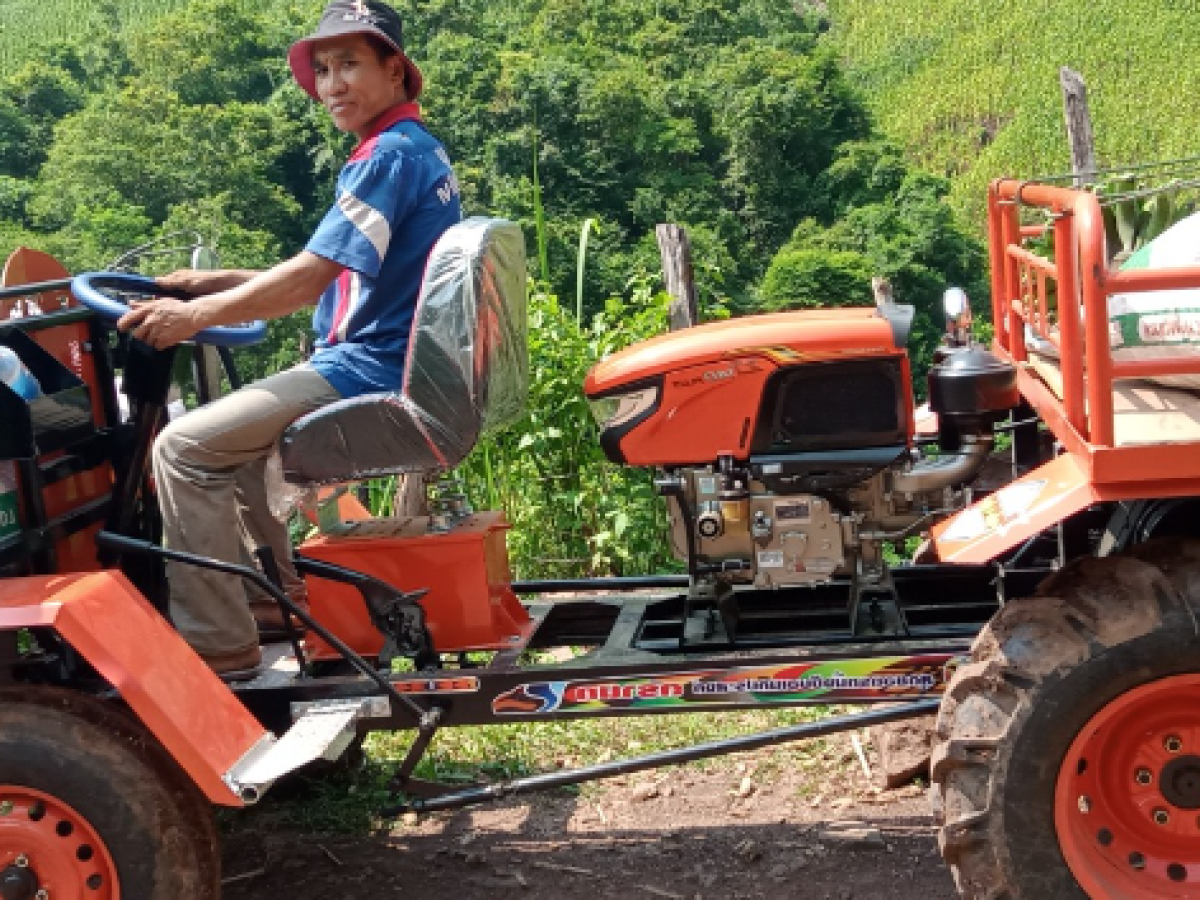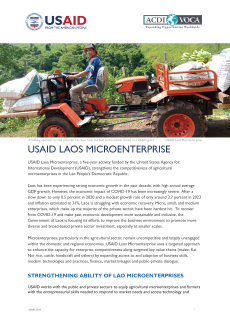USAID Laos Microenterprise, a five-year activity funded by the United States Agency for International Development (USAID), strengthens the competitiveness of agricultural microenterprises in the Lao People’s Democratic Republic.
Laos has been experiencing strong economic growth in the past decade, with high annual average GDP growth. However, the economic impact of COVID-19 has been increasingly severe. After a slow down to only 0.5 percent in 2020 and a modest growth rate of only around 3.7 percent in 2023 and inflation estimated at 31%, Laos is struggling with economic recovery. Micro, small, and medium enterprises, which make up the majority of the private sector, have been hardest hit. To recover from COVID-19 and make past economic development more sustainable and inclusive, the Government of Laos is focusing its efforts to improve the business environment to promote more diverse and broad-based private sector investment, especially at smaller scales.
Microenterprises, particularly in the agricultural sector, remain uncompetitive and largely unengaged within the domestic and regional economies. USAID Laos Microenterprise uses a targeted approach to enhance the capacity for enterprise competitiveness along targeted key value chains (maize, Kai Noi rice, cattle, handicraft and others) by expanding access to and adoption of business skills, modern technologies and practices, finance, market linkages and public-private dialogue.
STRENGTHENING ABILITY OF LAO MICROENTERPRISES
USAID works with the public and private sectors to equip agricultural microenterprises and farmers with the entrepreneurial skills needed to respond to market needs and access technology and finance. In addition, the project assists microenterprises to reduce operational costs by enhancing their negotiating power and establishing reliable linkages between farmers, and market opportunities.
INCREASING ACCESS TO MARKETS AND FINANCE
USAID helps microenterprises gain access to finance by increasing the ability of financial institutions, such as savings banks and credit unions, to manage and assess loans as well as develop new financial products tailored to the needs of microenterprises. USAID also helps microenterprises expand their markets both domestically and internationally. The project builds sustainable linkages with larger buyers within Laos and across the region, and promotes public-private dialogue about enabling environment issues that, if left unaddressed, could continue to constrain microenterprise growth.
KEY RESULTS
- To support investment in value chain infrastructure, reducing operation costs, and improving access to market, the project established a $800,000 matching grant fund where the project invests alongside the private sector in businesses and services to improve the competitiveness of microenterprises. As of Dec 2023, the project has supported investments of approximately $2,470,000 with $1,708,450 invested by the private sector, and $64,537 by the project.
- Since October 2021 the project has provided over 249 grants to agribusinesses, handicraft businesses and village agricultural service providers to expand services and markets to farming families. Project grantees have purchased over $11 million of commodities from approximately 16,500 microenterprises, and provided services worth over $1million to over 5,700 microenterprises. The project has supported 167 start-up entrepreneurs providing agricultural technology services to over 3,800 microenterprises.
- The project has trained over 11,340 representatives of farm based agricultural microenterprises “Farming as a Business” and or Businesses Supporting Farming in seven districts of Xiengkhouang province. This interactive training series caters to those with low literacy levels. An annual survey 2023 demonstrated that 97 percent of participants have adopted one or more skills and tools into their business; 67 percent of those surveyed have increased their income, allowing these farmers to invest more in their future farming activities. The business skills and tools are enabling farming microenterprises to improve their business planning and practices, and helping them to gain better prices, more income and higher profit.
- Under the COVID recovery work, the project has supplied over 2,800 pairs of glasses to address the old age disability of declining eyesight in mainly women connected to handicraft work; ~98% report a 59% increase in income returning to former levels of productivity. Additionally, the project has assisted agricultural microenterprises and individuals affected by the pandemic to reestablish their businesses.


